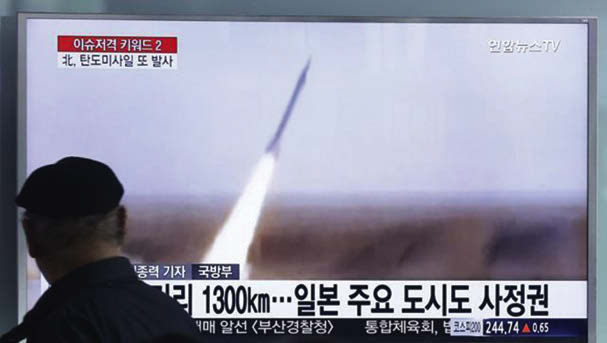US-based experts said that China and Pakistan are ‘passive enablers’ of the North Korean nuclear program and may face some secondary sanctions for violating UN approved sanction.
Scott Snyder, senior fellow at the Council for Foreign Relations said that Chinese support has led North Korean dictator Kim Jong-Un to believe that Beijing will vote for stability and not go so far as to threaten his regime security.
“The right way to describe China’s role is that they actually have been a passive enabler by providing generalized support to the North Korean regime,” Scott said.
Siegfried Hecker, former head of the Los Alamos National Laboratory concluded that North Korea may have a stockpile of sufficient fissile material for approximately 20 bombs by the end of this year and a capacity of adding approximately 7 per year.
China has long been accused of not putting sufficient pressure on North Korea and not implementing UN sanctions by allowing movement of goods and money across its border, a claim it has denied.
Experts believe that China wants North Korea as a buffer between its border and US and its allies.
“Why use the word accused, the evidence is pretty clear. China has agreed to do a lot of things that it hasn’t. A US news channel was filming cargo going back and forth on the North Korea-China border without any inspection. It is pretty clear that North Korean related organizations are operating in China,” says William Newcomb, Visiting Scholar at the United States Korea Institute in Washington DC and former UNSC panel member who helped impose sanctions on North Korea.
He believes that the Chinese are making a strategic blunder by confusing status quo with stability especially as North Korea is “90% a failed state” and the Chinese leadership is in effect implying that the “Chinese military will not be able to protect Chinese borders if North Korea collapses.”
North Korea carried out its fifth nuclear test last Friday, its second in less than a year. Experts have concluded that the underground explosion was stronger than the previous four triggering a magnitude 5.3 seismic event. The test was condemned by the international community and has led to increased tensions in the region with both China and US trading blame for not working to restrict North Korea’s nuclear program.
North Korea’s nuclear program is also known to have ties with Pakistan, which supplied it with schematics for nuclear weapons while the former is thought to have provided help on the Pakistan’s missile program.
Egypt and Iran have also coordinated with North Korea in the past.
The blatant violation of UN sanctions by some countries has raised the question of consequences for their actions.
Newcomb believes that violators should not be allowed to get away and that the UNSC should find ways to make violators to pay a price for their actions.
United States law requires the imposition of secondary sanction on entities that trade with North Korea. Here again, analysts believe that China can be a bigger target than Pakistan and Iran.
“The most interesting case really is China because of the extent of trade. There are more potential targets for secondary sanctions located in China. I think that you couldn’t necessarily rule that possibility out,” says Snyder.
According to him, Pakistan and Iran could also meet the threshold if the US intelligence community can come to a conclusion that there is sufficient linkages to warrant secondary sanction on entities from those countries. But the imposition of secondary sanctions after the current nuclear test will depend on US domestic politics especially given that the Obama administration is on its way out.
